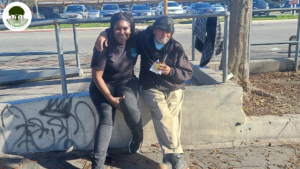What is the Housing First Approach?
The Housing First approach is a homeless assistance strategy that prioritizes providing people experiencing homelessness with stable, permanent housing as quickly as possible, without preconditions or mandatory participation in services like sobriety or mental health treatment. The philosophy behind Housing First is straightforward: by giving people a secure place to live first, they can focus on rebuilding their lives, improving mental health, pursuing employment, and addressing other needs.
How Does Housing First Work?
Under the Housing First model, individuals are placed directly into permanent housing with minimal barriers. Once housed, they are offered voluntary supportive services to help them maintain stability, such as case management, mental health care, and job training. The choice to engage with these services is left up to the individuals, as evidence shows that voluntary support is more effective for long-term stability than mandatory requirements.
Two main types of Housing First programs include:
- Permanent Supportive Housing (PSH): For individuals with chronic mental health or physical disabilities, this program provides long-term housing with access to supportive services.
- Rapid Re-Housing (RRH): This program provides short-term assistance, often through rental support and case management, to quickly move individuals from homelessness into permanent housing.
The Evidence Behind Housing First
Numerous studies validate the effectiveness of Housing First in ending homelessness and enhancing the quality of life for participants:
- Pathways to Housing in New York City, an early adopter of Housing First, saw that 88% of participants remained housed after five years compared to just 47% in traditional treatment programs. Similarly, another study in 2004 found that 79% of Housing First participants remained stably housed after six months, compared to only 27% in the control group HUD UserNational Low Income Housing Coalition.
- The Denver Supportive Housing Social Impact Bond Initiative demonstrated significant success in housing stability; participants in Housing First programs were housed for 654 days over three years, compared to only 94 days for those in traditional programs Housing Matters.
- In Santa Clara County, California, a Housing First trial found that 86% of participants in permanent supportive housing remained housed throughout a four-year study period. Participants also used fewer emergency healthcare services, reducing community costs Housing Matters.
Beyond providing stable housing, Housing First has been found to reduce hospitalizations and emergency visits, improve mental health outcomes, and decrease substance use among participants. It also reduces public expenses associated with emergency shelters, healthcare, and the criminal justice system, showing cost savings of up to $31,545 per person annually National Low-Income Housing Coalition | National Alliance to End Homelessness.
The Intentions of Housing First
Housing First’s primary goal is to end homelessness by addressing the most urgent need: a safe and stable place to live. By meeting this basic need, Housing First creates a foundation from which individuals can address other challenges, such as employment and mental health, without the instability of homelessness.
How HEDC is Implementing Housing First
High Expectation Development Corporation (HEDC) is committed to using the Housing First approach to help individuals and families in Southern California achieve stable housing and independence. Our Homelessness Housing Support and Rapid Rehousing programs provide housing without imposing preconditions, allowing individuals to stabilize and work toward self-sufficiency. Once housed, participants have access to voluntary services, including job training, mental health support, and financial literacy and personal development workshops, helping them build the skills and confidence necessary for lasting independence.
Why HEDC’s Housing First Approach is Different
HEDC’s approach to Housing First is uniquely focused on fostering a supportive community and prioritizing personal autonomy. While many organizations provide housing, HEDC’s supportive, individualized approach helps build confidence and encourages voluntary engagement with supportive services, which we’ve found to lead to better outcomes and stronger community integration.
Get Involved
Your support helps HEDC expand these life-changing programs. Here’s how you can help:
- Donate: Support our Housing First initiatives to provide stable housing for those in need.
Donate Now → - Volunteer: Join our efforts and be part of the solution to homelessness in Southern California.
Become a Volunteer →
Together, we can break the cycle of homelessness by providing the stability and support people need to thrive.
Sources
- HUD User. “Housing First: A Review of the Evidence.” HUD User
- National Low Income Housing Coalition. “Research on Housing First.” National Low-Income Housing Coalition
- National Alliance to End Homelessness. “Housing First.” National Alliance to End Homelessness
- Urban Institute. “Housing First Is Still the Best Approach to Ending Homelessness.” Housing Matters





